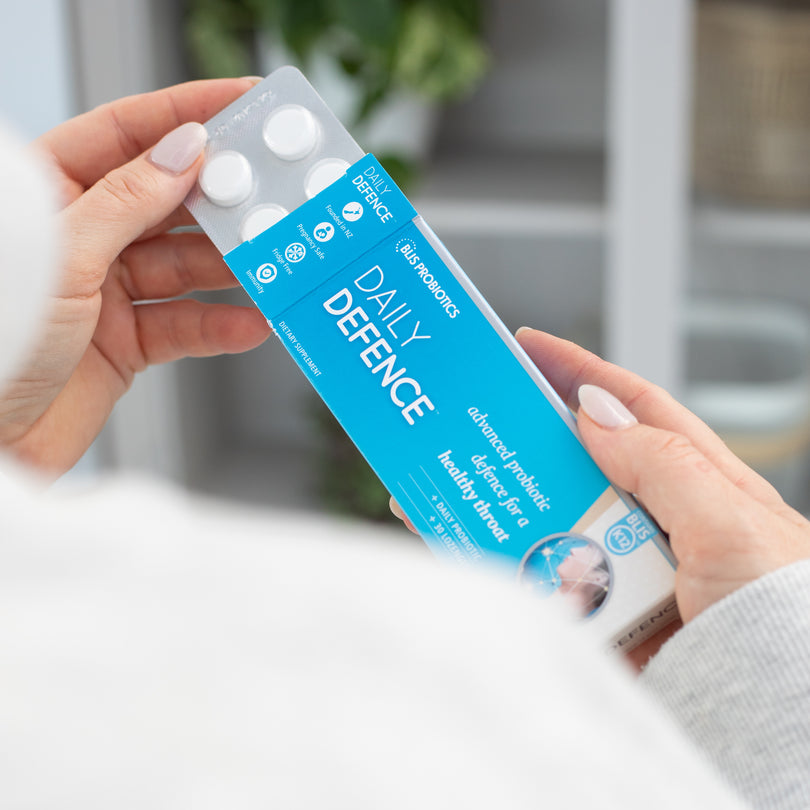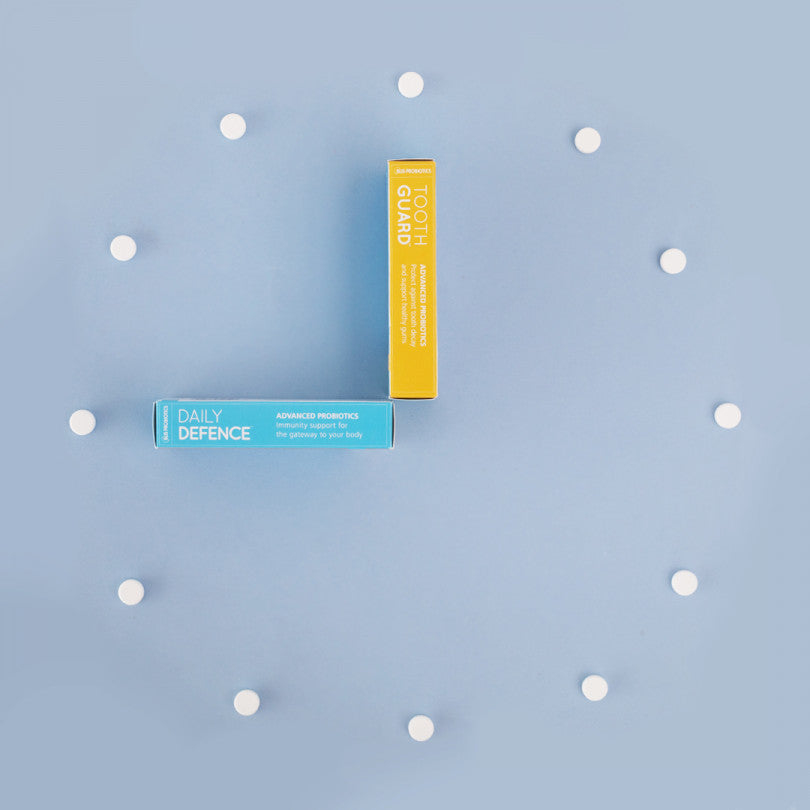Key Takeaways
- Immediate Action, Delayed Results: While the beneficial bacteria start colonising your system, noticeable improvements usually begin within 1 to 3 weeks of consistent daily use.
- Targeted Benefits are Faster: Digestive discomfort (like bloating) often sees relief sooner than systemic benefits (like improved mood or skin clarity).
- Consistency is Crucial: Skipping doses significantly delays progress, as the bacteria need regular replenishment to establish stable and beneficial colonies.
- Individual Results Vary: Your current gut or mouth health, the specific strain you choose, and your diet all determine your unique timeline for seeing benefits.
Probiotics have gained popularity for their potential to support gut, mouth and dental health, immunity, and overall well-being.
In this comprehensive guide, we'll explore the factors that influence the speed of probiotic effectiveness, set realistic expectations for your health journey, and provide actionable tips to maximise your results.
What is the General Timeline for Probiotic Results?
Probiotics begin to colonise your gut and other mucosal surfaces as the beneficial bacteria introduce new functions. This process starts the work of restoring the composition of the microbiome. However, noticeable effects typically begin within 1 to 3 weeks of consistent use.
For many individuals, subtle improvements in digestion, such as reduced gas and more regular bowel movements, are often the first positive signs probiotics are working for you. More significant and systemic benefits, such as enhanced immune response, improved energy, or better mood, may require a longer commitment, sometimes taking 4 to 6 weeks or more to fully manifest.
A General Timeline of What to Expect:
- Within the first week: Minor digestive changes, including less bloating or gas, as your gut flora begins to shift.
- 1 to 3 weeks: Clearer, more established digestive benefits, leading to improved regularity and comfort.
- 4 to 6 weeks: More noticeable overall wellness improvements, including increased energy and enhanced immune resilience.
Factors That Affect Probiotic Effectiveness
The speed at which you experience results is highly individual and depends on several key factors:
Probiotic Strain
Different probiotic strains are organised for distinct purposes and have varying timelines. For instance:
- BLIS K12®: Specific to oral health, often starts working within 1 to 2 weeks with benefits like fresher breath and reduced throat discomfort.
- BLIS M18®: Promotes dental health, with improvements such as reduced plaque and healthier gums appearing within 2 to 4 weeks.
- Targeted Gut Strains: These focus on digestive balance, with improvements appearing as soon as the beneficial bacteria start out-competing less desirable species.
Health Condition Being Targeted
The condition you are addressing is a major influence. A simple digestive imbalance may resolve quickly, while complex issues require more time. If you’re unsure about your starting point, it can be helpful to explore the signs you need probiotics to understand the level of support your system requires.
Diet and Lifestyle
A balanced diet rich in prebiotic fibres (found in vegetables, fruits, and whole grains) acts as fuel for probiotics, helping them thrive. Conversely, high stress levels, lack of sleep, and a poor diet loaded with processed foods can actively slow down your progress.
Consistency of Use
This cannot be overstated. Probiotics are living organisms that need continuous replenishment. Sporadic usage prevents the beneficial colonies from establishing themselves, which can delay or completely halt noticeable improvements.
Initial Gut Health
Individuals with a relatively healthy, balanced microbiome may notice subtle benefits quickly. However, those with a significant gut imbalance (dysbiosis), or those currently taking probiotics after antibiotics, may take longer to experience full benefits as their system has a greater imbalance to restore.
Maximising the Effectiveness of Your Probiotics
To ensure you get the quickest and most complete benefits from your supplement, adopt these essential habits
- Consistency: Take your probiotics at the same time daily or twice daily depending on the recommended dosage. Taking them with a meal or shortly after (for gut probiotics) is often preferred, as food buffers stomach acid, increasing bacterial survival. For probiotics that benefit the mouth and/or teeth and gums we recommend you take them after eating or drinking and leave at least 30 minutes before ingesting anything - this gives the probiotics the best possible chance to colonise successfully in the mouth.
- Pair with Prebiotics: Provide fuel for your probiotics! Prebiotic-rich foods like garlic, onions, bananas, asparagus, and oats help beneficial bacteria thrive in your gut and oral cavity. Knowing which foods have probiotics in them can also enhance your results naturally.
- Proper Storage: Always check the packaging. Some high-potency strains require refrigeration to maintain the live bacteria count (CFU), which is essential for effectiveness.
- Balanced Diet: Limit processed foods, excessive sugars, and refined carbohydrates, which can feed undesirable bacteria and sabotage the effects of your supplement.
Common Mistakes When Taking Probiotics
Avoid these pitfalls to ensure you are maximising your body's ability to utilise the beneficial bacteria:
- Inconsistent Use: Treating probiotics like an optional supplement. Daily, consistent use is non-negotiable for establishing and maintaining colonies.
- Wrong Strain for Your Needs: Not all strains are equal. Match the strain to your health goal (e.g., a specific oral strain for throat support vs. a multi-strain for digestive health).
- Ignoring Storage Instructions: Improper storage can kill the live bacteria, rendering the supplement ineffective before you even consume it.
- Unrealistic Expectations: Believing probiotics are a "quick fix" for long-term health issues. They work naturally and gradually.
Potential Side Effects When Starting Probiotics
When first introducing new probiotic strains, it is a normal sign of activity to experience mild side effects as your gut or oral microbiome undergoes a shift:
- Temporary Digestive Discomfort: Symptoms like gas, mild bloating, or subtle cramps may occur as the gut rebalances itself.
- Changes in Bowel Movements: You may notice temporary changes in frequency or consistency, which should normalise quickly.
If symptoms persist beyond two weeks or become severe, consult a healthcare provider.
How Long Should You Take Probiotics?
Probiotics are generally safe for long-term use and can be incorporated into your daily routine indefinitely as part of a preventative health strategy. For specific health concerns, consult your healthcare provider about the recommended duration of use. Many individuals cycle their probiotics or take short breaks, but continuous daily maintenance is often recommended for consistent support.
Final Thoughts: How Long for Probiotics to Work
Probiotics are a valuable addition to a healthy lifestyle, offering benefits that range from improved digestion and enhanced immune function to better oral health. However, setting realistic expectations about how quickly you’ll see results is crucial. Patience and persistence are the keys to long-term success.
Remember, probiotics are just one piece of the puzzle. Supporting your health with a balanced diet, managing stress, and staying active will always enhance their effectiveness.
Is it better to take probiotics in the morning or at night?
There is no universally “best” time to take probiotics. Consistency matters most. Taking them with or just after a meal is generally recommended, as food helps buffer stomach acid and improves the survival of beneficial bacteria. For probiotics that support the mouth, teeth, or gums, take them after eating or drinking and wait at least 30 minutes before ingesting anything else. This gives the probiotics the best chance to colonise successfully in the mouth.
Should I stop taking my probiotic if I do not feel a difference after one month?
Not necessarily. While some digestive benefits may be noticed within a month, other benefits such as immune support can take four to six weeks or longer to become apparent.
If I forget a dose, should I take two the next day?
No. Simply resume your regular dosage the next day. Taking a double dose can increase the chance of temporary side effects such as bloating without providing additional benefit.
Can I take a probiotic with hot coffee or tea?
It is best to avoid taking probiotics with very hot beverages. Excessive heat can kill live bacteria and reduce the effectiveness of the probiotic.







